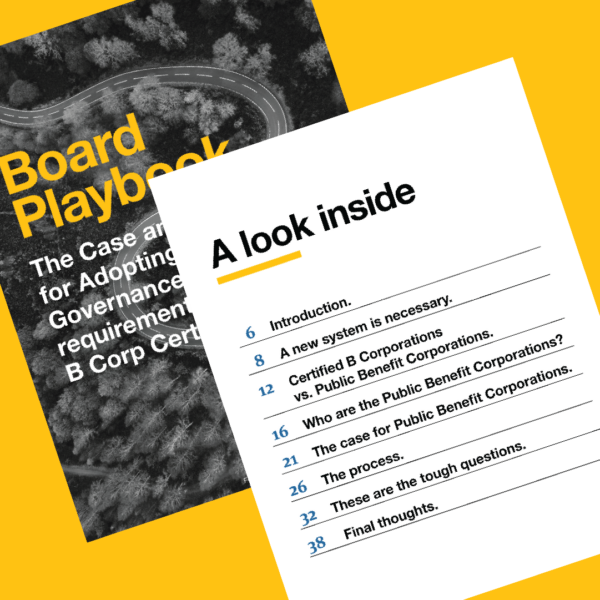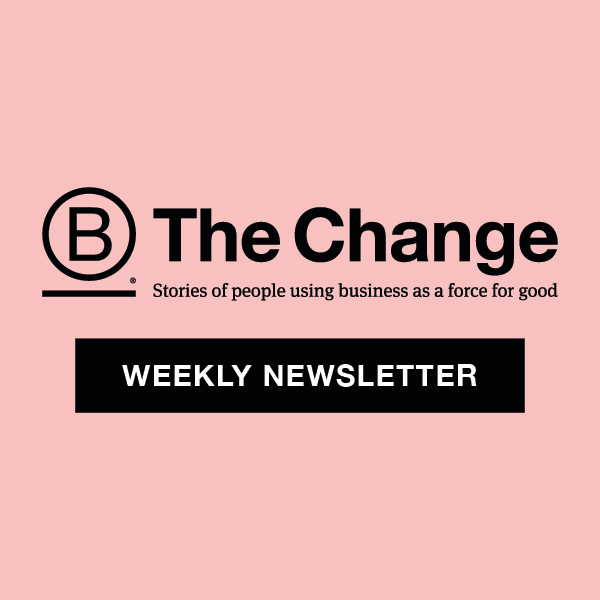Stakeholder Economy and Governance Around the World
June 2, 2022
The Growth of Benefit Corp and Stakeholder Governance and What It Signals for the Future of Business
In 2010, Maryland became the first state to pass a law allowing a company to incorporate as a benefit corporation. Companies that adopt benefit governance are required to consider their impact on all stakeholders — including workers, communities, suppliers, customers, and the environment — alongside shareholders and profits when making decisions and setting company policies. This legal change is a backbone to being a Certified B Corporation: Companies must alter their governing documents to consider, accommodate, and prioritize all stakeholders.
During the decades preceding Maryland’s passage of the benefit corp statute, shareholder primacy became the leading rule of corporate governance. This dominant form of corporate governance means businesses and their leaders are beholden only to shareholder profits — regardless of the impact their decisions have on people or the planet. Stakeholder-driven governance brings consideration for priorities beyond profits back to the board room. Benefit governance laws are two-pronged: A company is required to both consider all stakeholders in its decisions and report on the impact of its decisions. (Learn more about what being a benefit corp means in this article.)
As written by B Lab Global: “Benefit corporation status is a legal structure that gives businesses a solid foundation for long-term mission alignment and value creation. It protects a company’s social impact mission through capital raises and leadership changes, allows for more flexibility when evaluating potential sale and liquidity options, and creates a pathway for mission alignment to continue post-IPO.”

A New Way of Doing Business
To help business leaders navigate the journey to adopt benefit corporation status as a requirement of B Corp Certification, B Lab U.S. & Canada provides this resource, the Board Playbook, to lay out the process and demystify the risks.
Twelve years since the first statute in Maryland passed, the stakeholder economy has rapidly grown. Forty-two U.S. states, Puerto Rico, and Washington, D.C., now have benefit corp laws in the books, highlighting bipartisan agreement on ways businesses can operate with a broader lens. Globally, there are officially 52 benefit governance laws, including in France, Colombia, and British Columbia, Canada.
To date, these laws are all voluntary, meaning businesses can opt in — or not. B Lab and the more than 5,000 B Corps around the world are taking collective action to not only allow stakeholder governance but require it, in order to meet the urgency of the global challenges we need to solve.
Global Progress on Building a Stakeholder Economy and Policy Action
Collective policy action at the White House. Since 2020, B Lab U.S. & Canada alongside the U.S. Impact Investing Alliance launched a coalition of 60 impact-oriented organizations to work on creating a White House Initiative on Inclusive Economic Growth. This coalition is working with The Administration to advance policies that refocus corporations and investors on real and equitable value creation that promotes quality jobs, thriving communities and the resilience of our planet. The B Lab U.S. & Canada team has also been working closely with Congressional leaders to advocate for legislative changes drawing on these principles.
Climate action with the SEC. A proposed rule from the U.S. Securities and Exchange Commission (SEC), announced in early 2022, would require publicly traded companies to disclose information about their climate impact. It also has broader implications for other businesses, the U.S. economy, and the future of the Earth. B Lab Global and B Lab U.S. & Canada are submitting written commentary in support of the proposed rule. They are also supportive of the input provided by CERES in its Statement of Essential Principles, which was signed by more than 110 B Corps, and the comments from the Coalition on Inclusive Economic Growth, which represents 60 impact-oriented business and investor organizations. B Lab U.S. & Canada and B Lab Global’s comments also request that the SEC refine the materiality assessment associated with Scope 3 disclosures in order to avoid costly underreporting, noting that more than 1,700 companies globally have committed to achieve Net Zero by 2030 (which requires measuring Scope 3 emissions). Additionally, 40% of companies already report that they measure at least some portion of their Scope 3 emissions, according to data collected for companies across locations and sizes from the SDG Action Manager.

Learn more about this growing movement of Certified B Corporations using business as a force for good, and sign up to receive the B The Change Weekly newsletter for more stories like this one, delivered straight to your inbox once a week.
Global leaders bring stakeholder governance and coalition-building to Skoll World Forum. In April 2022, B Lab Global Network leaders gathered at the Skoll World Forum for a conversation on our coordinated efforts to create a favorable policy environment for stakeholder governance in jurisdictions around the world. They discussed how this work is expanding beyond the B Corp movement. These highlights include:
- B Lab UK: B Lab UK’s Executive Director Chris Turner discussed the extensive coalition-building that has gone into the movement for the Better Business Act (BBA). This is proposed legislation that would amend the UK’s 2006 Companies Act to ensure that all UK companies are legally responsible for benefiting workers, customers, communities and the environment. This included the plans for Better Business Day, an action in UK Parliament that brought together 1,000 businesses in late April to advocate for the passage of the BBA. As shared in an article Turner wrote: “Our work to change the economic system begins with B Corps as a proof of concept, but we also need to harness this proof to make the case for – or to demand – change at an even greater scale. This change may come through the further growth of the community; through programmes targeted at specific outcomes such as climate action; or through policy and campaigns such as the Better Business Act. Whichever of these levers we deploy, effectiveness will be multiplied by the scale and diversity of the B Corp Community.
- Sistema B Colombia: Camilo Ramirez spoke about the momentum that stakeholder governance has been gaining in Latin America, all with active involvement of Sistema B. Examples include:
- the new benchmark for sustainable companies on the Sao Paulo Stock Exchange;
- the Chile Con Proposito framework bringing together businesses, academics, and civil society actors to advocate for positive corporate social and environmental impact; and
- the recent ExpoBic conference of Collective Benefit and Interests societies, at which Colombian President Ivan Duque spoke about the importance of benefit corporations.
- B Lab Europe: Wojciech Baginski, a B Corp movement leader in Poland and co-founder of the Interdependence Coalition, spoke about the ways in which the Coalition is advocating within EU Parliament to improve company law frameworks and enable the adoption of stakeholder governance. This allows businesses to better align their interests with practices that bring benefit to the environment, the communities they operate in, and society at large. Baginski also discussed how this work is happening in concert with the European Green Deal.
Sign Up for our B The Change Newsletter
Read stories on the B Corp Movement and people using business as a force for good. The B The Change Newsletter is sent weekly.
